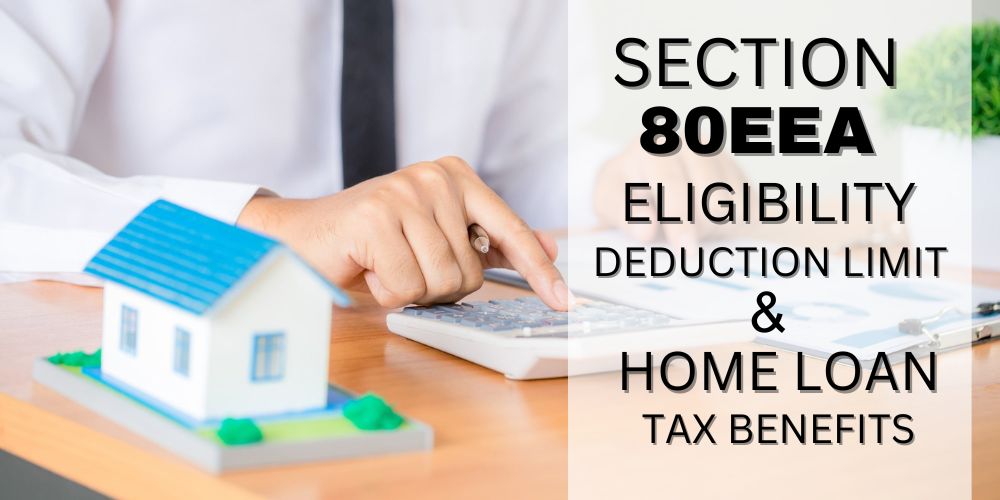Navigating the intricacies of tax deductions can be challenging, especially when it comes to home loans. Section 80EEA of the Income Tax Act offers specific benefits to individuals taking out home loans. Understanding this section’s details, eligibility criteria, and limits can help you make the most of these tax benefits. Here’s a comprehensive guide to Section 80EEA, including how it compares with Section 80EE and other tax deductions related to home loans.
Understanding Section 80EEA
Section 80EEA provides an additional tax benefit to individuals taking a home loan for the purchase of their first residential property. This deduction is in addition to the benefits available under Section 24(b) and Section 80C. It is designed to encourage home ownership by making the financial burden lighter for first-time home buyers.
80EEA Deduction Eligibility Criteria
To qualify for the 80EEA deduction, the following criteria must be met:
- First-Time Home Buyer: The deduction is available only to first-time home buyers. This means you or your spouse should not have owned any residential property before.
- Home Loan: The home loan should be sanctioned between April 1, 2019, and March 31, 2022.
- Property Value: The stamp duty value of the property should not exceed ₹45 lakhs.
- Loan Amount: The loan must be taken from a financial institution or a housing finance company.
80EEA Deduction Limit
The 80EEA deduction limit is capped at ₹1.5 lakhs per financial year on the interest paid on the home loan. This is over and above the deduction allowed under Section 24(b), which also covers interest on home loans. It’s crucial to remember this Sec 80EEA limit when planning your tax benefits.
Difference between Section 80EE and Section 80EEA
Here’s a comparison of Section 80EE and Section 80EEA in a tabular format to help clarify their differences:
| Feature | Section 80EE | Section 80EEA |
|---|---|---|
| Eligibility | First-time home buyers with a loan amount up to ₹35 lakhs and property value up to ₹50 lakhs | First-time home buyers with a property value up to ₹45 lakhs |
| Deduction Limit | ₹50,000 on interest | ₹1.5 lakhs on interest |
| Loan Sanction Period | April 1, 2016 to March 31, 2017 | April 1, 2019 to March 31, 2022 |
| Property Ownership | Should not own any other property | Should not own any other property |
Tax Benefits on Home Loan
Several tax benefits can be availed on home loans, making it essential to understand each section’s advantages:
Deduction on Interest Paid (Section 24(b))
Under Section 24(b), you can claim a deduction of up to ₹2 lakhs on the interest paid on home loans for self-occupied property. This benefit is available for both new and existing loans and can significantly reduce your taxable income.
Deduction under Section 80C for Stamp Duty and Registration Charges
Section 80C provides deductions up to ₹1.5 lakhs for principal repayments on home loans, including stamp duty and registration charges. These expenses can be claimed within the overall limit of ₹1.5 lakhs allowed under Section 80C.
Deduction under Section 24(b) on Joint Home Loan
If you have taken a joint home loan, each borrower can separately claim the ₹2 lakhs deduction under Section 24(b) on interest paid. This effectively doubles the benefit if both borrowers are eligible.
Deduction on Pre-Construction Interest
Interest paid on a home loan during the pre-construction period can be claimed under Section 24(b) in five equal installments starting from the financial year in which the construction is completed. This helps in reducing the overall tax burden over the years.
Best Home Loan Provider in Delhi NCR – SFS Enterprises
If you’re searching for the best home loan provider in Delhi NCR, look no further than SFS Enterprises. Known for their customer-centric approach and competitive loan offerings, SFS Enterprises is a trusted name in the region. They offer tailored solutions to suit your financial needs and help you maximize your tax benefits.
FAQs
Can joint owners be eligible for deduction under Section 80EEA?
Yes, joint owners can claim the deduction under Section 80EEA if they meet all the eligibility criteria. Each owner can claim the deduction up to ₹1.5 lakhs individually.
Can I claim deduction of principal repayment on home loan under Section 80EEA?
No, Section 80EEA provides deductions only on interest paid. Principal repayments are covered under Section 80C.
Can deductions under Section 24 and Section 80EEA be claimed simultaneously?
Yes, you can claim deductions under both Section 24(b) and Section 80EEA simultaneously. Section 80EEA is an additional benefit on top of the Section 24(b) deduction.
For how many years is the deduction under Section 80EEA available?
The deduction under Section 80EEA is available for the financial year in which the loan was sanctioned and for the subsequent years until the loan is fully repaid or the benefit period ends.
Can I claim interest payment deduction on a home loan under Section 80EE & 80EEA simultaneously?
No, you cannot claim deductions under both Section 80EE and Section 80EEA for the same home loan. You need to choose the section under which you will claim the deduction based on your eligibility and the deduction limits.
Can I claim deductions under Section 80EEA after I buy my second property?
No, Section 80EEA is available only for the first residential property. If you purchase a second property, you will not be eligible for deductions under this section.
By understanding the nuances of Section 80EEA, along with other relevant sections, you can effectively manage your tax liabilities and make informed decisions about your home loan. For personalized advice and the best home loan service in Delhi NCR, consider reaching out to SFS Enterprises for expert guidance.

